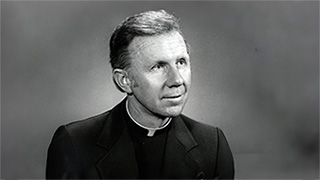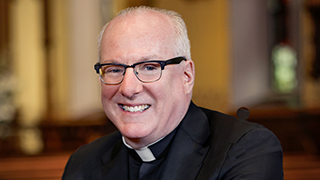Acceptance Of Suffering With Grace: The Life Example Of St. Paul in Modern Catechesis
Tuesday, May 28, 2024

Laura Balogh, faith and formation director at Notre Dame of Mount Carmel Parish in Cedar Knolls, New Jersey, was one of 30 participants who attended a conference on the ministry of catechesis, "Grace and Action: The Ministry of Catechists in the Footsteps of St. Paul," held by Immaculate Conception Seminary School of Theology and The Lay Centre at Foyer Unitas in Rome last summer. Here, Laura shares her reflections on the challenges and rewards of her work as part of ICSST’s 4-12 Profiles in Faith series.
Being a catechist in today’s world is not easy. While it is a joy and privilege to form our parents and children in faith, those in the ministry of catechesis face challenges that threaten to undermine our morale and focus.
Many factors underlie these challenges. Society has become much more secular in the past fifty years. Since the COVID-19 pandemic, one in three practicing Christians stopped attending Mass regularly, and have never returned. Families are busier than ever, with parents having to balance work and their children’s activities. Consequently, it is increasingly difficult to persuade parents to commit to weekly Mass attendance and engagement in religious education sessions, even to attain the sacraments, so the number of enrollees continues to decrease each year.
These realities can dishearten catechists since they truly desire to help bring young families closer to Jesus and the fulfillment of a relationship with Him. How should catechists respond to these challenges in a positive way and remain focused on the important work God is calling them to do? The recent pilgrimage to Rome has revealed that there is hope.
We can draw strength and inspiration from the splendid example of the life of St. Paul, who was responsible for spreading the teachings of Jesus to the first century world. St. Paul faced enormous obstacles in building up the Body of Christ, yet he was continually on fire with love for Him. Church teaching recognizes this ardor and urges catechists to stoke it in our own hearts today.
Christian catechists need this boldness and zeal to faithfully face suffering and persevere in ministry. Paul experienced suffering in all its forms in the decades that followed his dramatic conversion while on the road to Damascus. Despite these challenges, he never gave up and was able to say at the very end of his life, "I have competed well, I have finished the race; I have kept the faith."
Most Christians today do not face the life-threatening persecutions that were daily realities for St. Paul and countless martyrs in the early days of the Church. However, the life of a modern disciple still requires sacrifice. Entering through the narrow gate as Jesus taught forces the faithful out of their comfort zones. Catechetical leaders face conflicts with parents, unwilling participants in faith formation sessions, lack of resources, and parish budget constraints. Teachers plant seeds in classes but frequently never get to see any germination of faith in their participants. This may result in discouragement and doubt. The answer is not to despair, but to stay close to our Lord, and look to St. Paul as a guide.
The life of St. Paul provides an exemplary model of faith for modern catechists. He embraced his suffering as a normal part of life and a privilege that God grants to grow in virtue and holiness. Paul understood how to respond to others with love, expressing gentleness even in the face of disagreement. He continually sought to identify, nurture and develop new leaders and put them to work in areas consistent with their charisms.
Catechists can follow St. Paul’s example by embracing, rather than shrinking, from suffering, and seeing occasional desolations as opportunities to grow in personal holiness and share in Christ’s passion. Directors of religious education need to prioritize people, mentoring, training and encouraging new teachers in faith formation. Spending time with the Lord regularly through regular prayer and the receipt of the sacraments is an essential part of this process. This balanced approach will provide catechists with the grace to serenely persevere as they fulfill their baptismal call to "go…and make disciples of all nations." (Matthew 28: 18-20)
This article is part of Immaculate Conception Seminary School of Theology’s 4-12 Profiles in Faith series, which shares the academic and personal journeys of its study body as part of the 4-12 Pathway for Pastoral Leadership initiative. To view additional profiles and learn more about the series, 4-12 pathway or ICSST, visit our website.
Categories: Faith and Service, Nation and World






